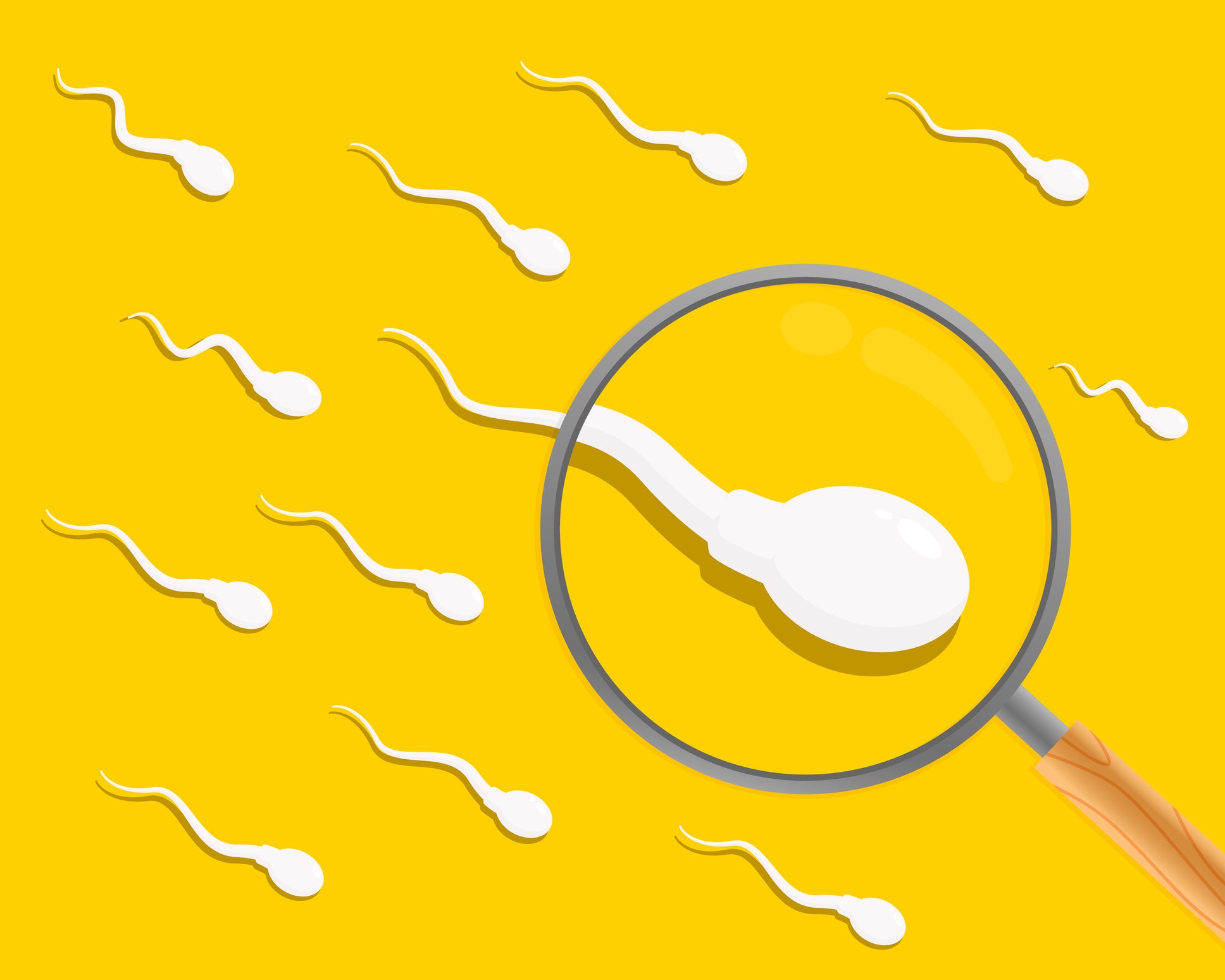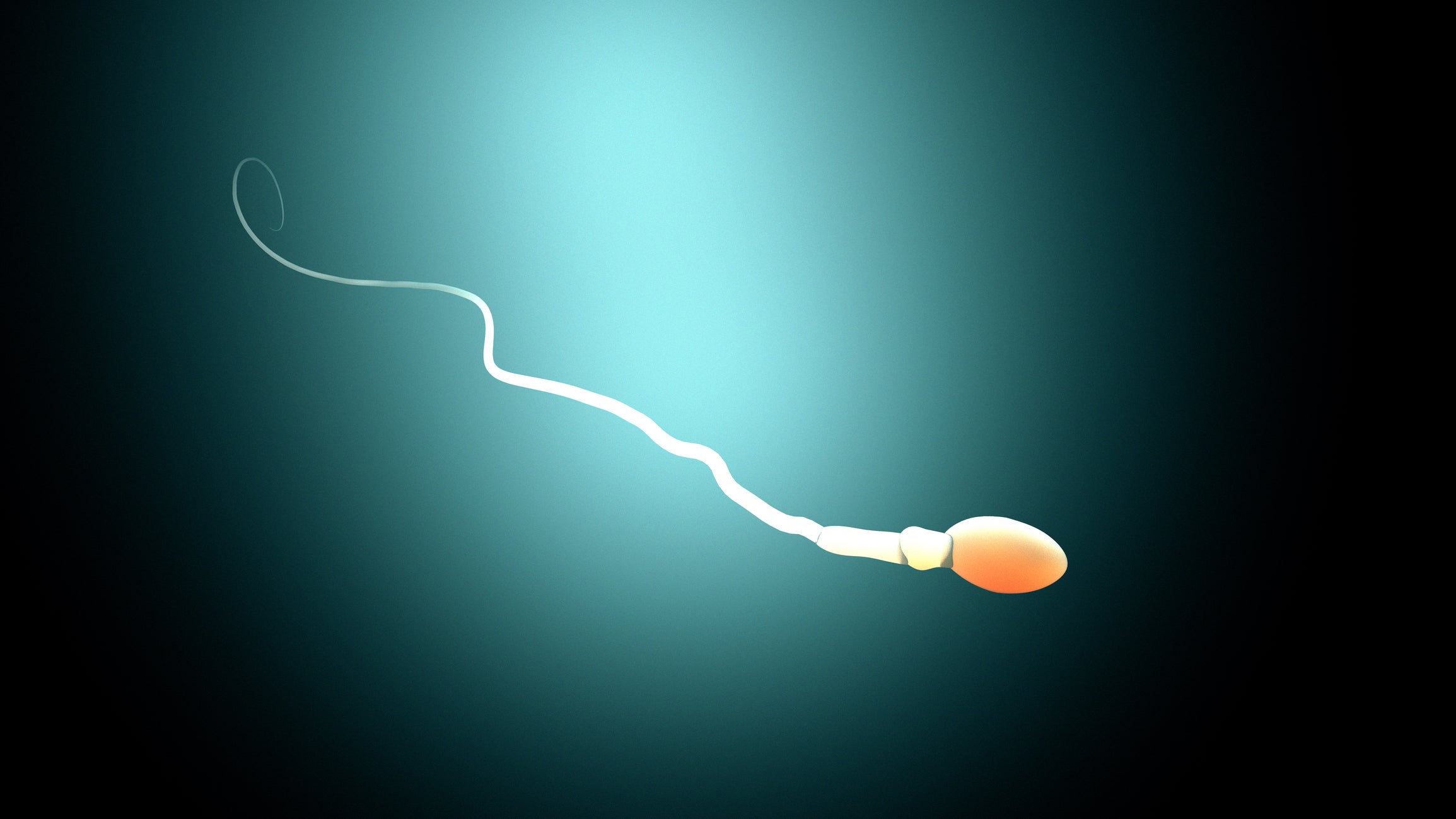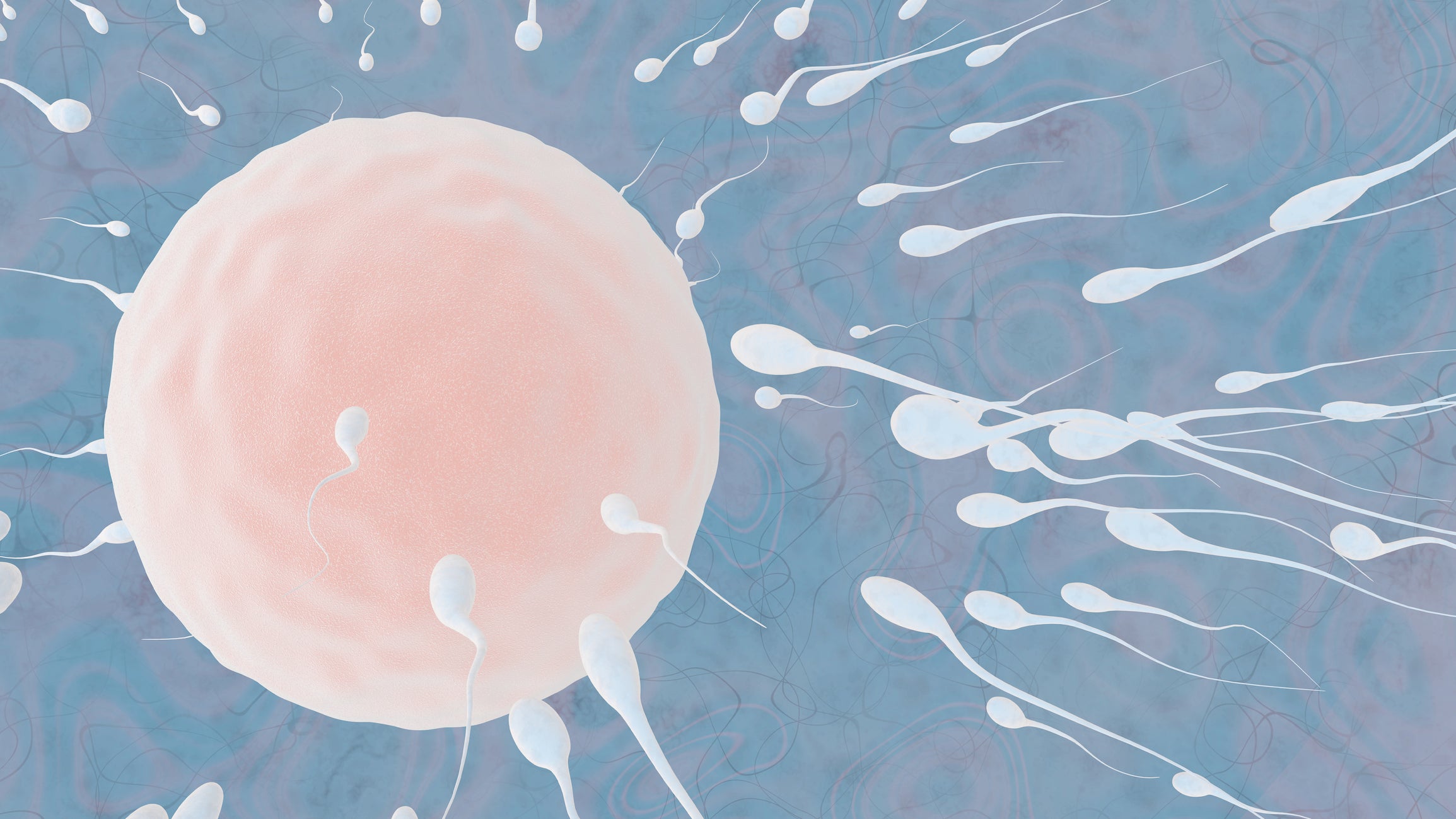-
Can Certain Medications Affect Your Sperm Health?

Man rethinking taking medication.
Often, infertility is assumed to be a woman’s problem. However, male infertility is also significant, and sperm quality can heavily impact the chances of conception. Many factors can affect male fertility, including excess weight, cigarette smoking, excessive drinking, and use of recreational drugs. While all of these factors are commonly known, what is less well known is that certain medication can interfere with male fertility.
How can medications affect a man’s fertility? Often, medication will decrease the production of sperm, but in some cases, medications will affect the function of the sperm itself. Decreased production leads to low sperm count, which means fewer sperm will be available to fertilize an egg. If a medication impacts the motility of the sperm, that means the sperm won’t move as efficiently and will have difficulty reaching the egg. Generally, once a man stops taking medication, it takes at least two or three months for his sperm to recover, since it takes that long for sperm to form and mature. With certain medications, however, it can take months or years for fertility to return to normal, and it might not return at all.
So, what types of medications have a negative impact on sperm? Over-the-counter medication does not usually cause an issue, as long as it’s taken correctly and in the proper dosage. However, it’s important to be cautious when you’re trying to conceive, so it’s wise to discuss any OTC medications with your doctor. Certain OTC medicines warrant particular caution:
- Non-steroidal anti-inflammatory drugs (NSAIDs) sometimes reduce fertility. According to a recent study, men taking 1,200 mg of ibuprofen daily can develop a hormonal condition that causes a problem, especially if the man is older. What was not made clear in the study is whether lower doses of ibuprofen can have the same effect. Additionally, while the effects are reversible when the medication is taken for short periods of time, it’s unclear whether they’re reversible if taken long-term.
- Natural or herbal remedies can cause problems for men trying to conceive. Because herbal remedies are not held to the same regulatory standards as medications, it’s better to stay away from them to protect fertility. Supplements that contain testosterone can be particularly problematic, so avoid anything that uses terms like “male enhancement,” “andro booster,” or “T-booster.”
There are prescription medications that can have a significant impact on fertility.
- Steroids and testosterone therapy can have a strong negative impact on sperm production. In fact, testosterone supplements will completely stop sperm production. Whether the man is taking anabolic steroids, herbal supplements with testosterone, or a prescription testosterone replacement from the doctor, the effect is the same. Testosterone blocks the body’s natural hormonal signals that cause the testicles to make sperm. The result is that the semen will either have a very low concentration of sperm or will have no sperm at all. This effect is reversible, but it takes a long time for the sperm to recover. In fact, it can take six to 12 months for sperm count to get back to normal.
- Chemotherapy can wipe out your sperm count. This is because chemo works by killing rapidly dividing cells, like cancer cells, but also, unfortunately, sperm cells. After cancer treatment, it’s common for men to have no sperm in the semen. However, natural fertility can return one to five years after the treatment is discontinued. If you’ve been through chemo, it’s best to wait at least two years before attempting to conceive. For some people, though, fertility never recovers. If you are about to start chemotherapy, talk to your doctor about freezing your sperm for later use.
- Blood pressure medications can decrease semen volume, sperm concentration, and sperm motility. These medications, especially calcium channel blockers, can also cause decreased libido and erectile dysfunction.
- Opioids can interfere with sexual performance and fertility. Long-term use, in particular, can disrupt the signals that control testosterone production. If you’ve only used opioids short-term, as for the treatment of a broken bone or when recovering from surgery, you may not need to worry.
- Antidepressants can cause a drop in libido and may negatively affect sperm production. Selective serotonin re-uptake inhibitors (SSRIs) are the most common medications used to treat depression and anxiety, and they can hinder your chances of conception. However, there are other medications your doctor or mental health provider can prescribe that won’t have the same impact.
- Other medications may be problematic if you’re trying to conceive. Antibiotics can interfere with testosterone and sperm production, especially an antifungal antibiotic called Ketoconazole. Biologics, used to treat autoimmune disorders, can reduce sperm count, and alpha-blockers, prescribed to treat the symptoms caused by an enlarged prostate, can inhibit ejaculation. 5-alpha-reductase inhibitors like Propecia® and Avodart®, used for hair loss and prostate enlargement treatment, can make it hard to conceive, but the effect goes away when you stop taking them. Anti-epilepsy medications, antiretrovirals, blood pressure medications, and some other medications can also cause fertility problems.
At the Center for Vasectomy Reversal, we are concerned with every aspect of men’s health, and we pride ourselves on helping men improve their fertility through uncompromising, concierge-level patient care. Under the direction of Dr. Joshua Green, our team provides state-of-the-art treatment for men who need a reversal of their vasectomy or have other fertility concerns. To learn more, contact us through our website or call 941-894-6428.
-
How Low Testosterone Can Affect Your Sperm Health

Low testosterone levels can have a serious effect on your sperm health. It’s important to understand why testosterone is so important for effective sperm production, and how you can keep your sperm healthy even if you have low testosterone. In this blog post, we will discuss the relationship between testosterone and sperm health, as well as the potential treatments available to ensure your sperm are in top condition.
What is Testosterone?
Testosterone is a hormone produced by the male body that helps stimulate reproductive organs including the testicles, prostate, and seminal vesicles. It is responsible for the development of secondary sexual characteristics such as facial hair growth, deepened voice, and increased muscle mass. Testosterone plays an important role in maintaining proper sperm production and fertility.
The Role of Testosterone in Sperm Health
Low testosterone levels can lead to decreased sperm count, poor motility (movement), lower quality DNA integrity, and reduced overall semen volume. These factors can all contribute to infertility or difficulty conceiving naturally. Low testosterone levels can also lead to erectile dysfunction or reduced libido which can further impact fertility issues.
Signs That Your Testosterone Levels May Be Too Low
Low testosterone levels can have a huge impact on your health. If you are concerned that your testosterone levels might be too low, read on to learn eight signs that may indicate a problem:
- Decreased Muscle Mass: Muscle mass is an indicator of healthy testosterone levels. If you find that you are losing muscle mass even though you are exercising regularly, it could be a sign that your testosterone levels are dropping.
- Fatigue: Testosterone plays a role in energy production in the body. If you tend to feel tired throughout the day or find yourself needing frequent naps, it could be due to low testosterone levels.
- Loss of Libido: Low testosterone can cause changes in libido, including difficulty getting aroused and decreased sexual desire.
- Decreased Bone Density: One benefit of healthy testosterone levels is increased bone density and strength in men over 30 years old; however, low T-levels can lead to weaker bones and an increased risk of fractures and other injuries.
- Hair Loss: Hair loss is another common symptom associated with lower-than-normal testosterone levels; however, this condition is often attributed to genetics rather than hormone imbalances – so hair loss does not always mean that there’s something wrong with your hormones!
- Irritability: If you’re feeling especially irritable lately, or if small things seem to bother you more than usual, it could be related to lower-than-normal T-levels. A blood test will help determine whether hormonal imbalance may be at play here.
- Difficulty Concentrating: If you find yourself having difficulty concentrating on tasks at work or school lately – or simply having trouble remembering things – then low T-levels may indeed be part of the problem!
- Mood Swings: Mood swings can sometimes occur when testosterone levels become too low. While they aren’t necessarily dangerous (as long as they don’t interfere with daily life), they can indicate an underlying hormonal imbalance that should be addressed, if possible, through lifestyle changes or medical intervention from Centers for Vasectomy Reversal specialists.
Male Fertility Testing Services
The Center for Vasectomy Reversal has many years of experience providing comprehensive male infertility testing services designed specifically to identify any issues related to low testosterone or other issues impacting sperm health that may be preventing conception naturally– contact us today to learn more!
-
What is Semen Aspiration?

Semen aspiration, also referred to as sperm retrieval, is a medical procedure used to collect sperm from the male reproductive tract body for use in fertility treatments. The sperm retrieved are used to fertilize the eggs of the female partner through in vitro fertilization (IVF). There are many different techniques that can be used for sperm retrieval, and the best method will depend on the individual’s situation.
There are several reasons why this procedure may be necessary, including sperm transport disorders, blockages in the reproductive tract, or a lack of sperm production. Read on to learn more about semen aspiration, why it’s done, and what to expect during the procedure.
What to Expect During Semen Aspiration Treatment
There are a few different methods of semen aspiration treatment. The sperm may be retrieved from the testicles, epididymis, or vas deferens. In some cases, the sperm may be obtained from the ejaculate.
Semen aspiration is typically performed under sedation or anesthesia. A needle is used to retrieve the sperm, which are then collected in a sterile container. The procedure usually takes less than 30 minutes.
In most cases, semen aspiration is successful in retrieving sperm for use in IVF. Semen aspiration is considered a low-risk fertility treatment and has a high success rate.
What Are the Risks of Semen Aspiration?
Although semen aspiration is generally safe and effective, there are some risks associated with the procedure.
First and foremost, there is a small risk of infection. The uterus is a sterile environment and introducing bacteria from the outside can lead to an infection. There is also a slight risk of puncturing the uterus, which can cause internal bleeding. In very rare cases, this can lead to serious health complications.
There is a very small risk that the needle used to aspirate the semen will damage the embryo. However, this is typically only a concern when aspiration is performed before implantation has occurred.
Overall, while there are some risks associated with semen aspiration, they are generally very rare and can be effectively mitigated with proper medical care. As such, semen aspiration remains a safe and effective way to collect genetic material. Risk can be minimized by working with an experienced medical professional.
Why is Sperm Retrieval Needed?
The most common reason for needing sperm retrieval is due to a blockage in the man’s reproductive tract. This blockage can occur at any point along the way, from the testicles to the opening of the penis. A blockage can be caused by an injury, surgery, or a birth defect.
In some cases, a man may have no sperm in his ejaculate at all. This is called azoospermia and can be caused by several factors, including infection, cancer, and other conditions.
Why Choose Us?
The Center for Vasectomy Reversal in Florida is one of the world’s leading fertility centers, offering a wide range of fertility treatments to help couples conceive. Sperm retrieval is used for men who have had a vasectomy or for those who have a condition that prevents them from producing sperm.
At CVR, our experienced team offers a variety of sperm retrieval techniques, including microsurgical epididymal sperm aspiration (MESA), percutaneous epididymal sperm aspiration (PESA), and testicular sperm extraction (TESE). We also offer intracytoplasmic sperm injection (ICSI), which can be used in conjunction with any of these techniques. Our goal is to help you conceive the healthy baby you’ve always wanted. Contact us today to learn more or to schedule a consultation!
-
Fun Facts About Semen

Here’s a well-known fact that we rarely mention: None of us would exist without semen. Why stop there? Let’s learn more about this fluid vital for human life.
Semen vs Sperm
People use these terms interchangeably, but they mean different things. Stated simply, semen is the bodily fluid that contains sperm.
What Else Is In Semen?
In addition to sperm, semen also contains other ingredients. According to WebMD, “the fluid is made mostly of water, plasma, and mucus (a lubricating substance). It also contains 5 to 25 calories, and is made up of small amounts of essential nutrients including: calcium, citrate, fructose, glucose, lactic acid, magnesium, potassium, protein and zinc.” These ingredients serve an important purpose. Sperm “need nutrients because they must travel a great distance and withstand the harsh environment of the vagina. The nutrients found in semen will keep the sperm alive and provide energy while they race to the egg. Their main energy source is fructose, a type of sugar.”
Sperm Count / Density
When men ejaculate they release an average of 2-6 milliliters (mL) of semen, or approximately a 1/2 teaspoon to 1 teaspoon. Each milliliter contains an average of 15 million sperm. Sperm count can be affected by lifestyle, environment and age, though healthy men over age 70 still have the potential to have children.
Sperm Motility
Sperm motility is “the percentage of sperm in a sample that are moving, as well as an assessment of how they move,” according to WebMD. “One hour after ejaculation, at least 32% of sperm should be moving forward in a straight line.” And according to Sarah Vij, MD, director of the Center for Male Fertility at Cleveland Clinic, “The optimal timing between ejaculations in a man trying to cause a pregnancy is 24-48 hours to allow for a release of a high number of motile sperm.”
Sperm Life
According to a post from Patricio C. Gargollo, M.D. of Mayo Clinic, “The life span of sperm after ejaculation depends on the circumstances. Ejaculated sperm remain viable for several days within the female reproductive tract. Fertilization is possible as long as the sperm remain alive — up to five days. Sperm can also be preserved for decades when semen is frozen.” One thing keeping sperm alive inside the cervix is cervical mucus.
Healthy Sperm
WebMD gives the following advice for healthy sperm:
- Don’t smoke or use illegal drugs, especially anabolic steroids.
- Avoid toxins such as pesticides and heavy metals.
- Limit alcohol intake.
- Maintain a healthy diet and weight.
- Keep your scrotum cool, because heat slows sperm production. Avoid hot baths and tight pants. Wear boxers instead of briefs.
At the Center for Vasectomy Reversal, we are committed to helping men overcome reproductive issues and start healthy families. We pride ourselves on helping men improve their fertility through uncompromising, concierge-level patient care. Under the direction of Dr. Joshua Green, our team provides state-of-the-art treatment for men who need a reversal of their vasectomy or have other fertility concerns. To learn more, contact us through our website or call 941-210-6649.
-
Foods that Affect Sperm Count

Did you know that the sperm count of the average man has steadily decreased over the past 40 years? Why is this happening? Is it a problem that the quality of sperm is decreasing? It is certainly a problem for a man who is struggling with infertility. Fortunately, there are some things you can do to promote your sperm quality, and it starts with eating the right foods.
How big of a problem is decreasing sperm quality? The Centers for Disease Control and Prevention (CDC) estimates that a male factor as well as a female factor is involved in about 35 percent of couples experiencing infertility. Additionally, a recent study estimates that sperm counts have dropped by 59 percent, on average over the past 38 years. What’s causing this decrease? No one really knows. Some blame technology like cell phones and laptops, which produce fertility-threatening heat. Obesity may be a factor. And there’s a body of research to indicate that a man’s diet has an impact on sperm count. Here are the dietary do’s and don’ts for improving your fertility.
First, here are the foods to avoid if you want to boost fertility:
- Processed meats, eaten three or more times a week, can reduce your chance of achieving pregnancy by 28 percent. Red meat is also related to low sperm concentration and sperm count, and processed red meat also alters sperm motility. Eating fish and poultry is better for your fertility.
- Trans fats increase the risk of heart disease and decrease sperm counts. In fact, sperm with the highest trans-fatty acid levels are linked to low sperm concentrations. Trans fatty acids typically come from French fries and commercially baked items, as well as foods like frostings and things cooked with lard.
- Soy products have phytoestrogens, estrogen-like compounds that interfere with fertility. Soy milk, veggie burgers, protein bars, tofu, and tempeh are soy-based foods linked to low sperm count, particularly in overweight men.
- High fat dairy products have been linked to abnormal sperm shape and low motility. Whole milk, cheese, and cream are all on the do-not-eat list, because as few as three slices of cheese a day can endanger fertility. Low-fat dairy, however, is linked to higher sperm concentration and motility.
- Pesticides and bisphenol a (BPA) can make their way into your food and diminish fertility. Pesticides can be on vegetables and fruits as well as meat and fish. BPA is in food packaging and cans and can leech into the foods we eat. These chemicals, which area also found in non-stick cookware act as xenoestrogens and decrease sperm concentration.
- Sometimes what you drink can impact your fertility. Alcohol and beverages with excessive caffeine have been linked to a decrease in male fertility.
Now that you know what to avoid, what should you eat? Certain foods have been shown to increase male fertility and improve sperm health.
- Eat your veggies. Fruits and vegetables, especially green leafy vegetables and legumes, have been shown to improve sperm concentration and motility. It’s believed that this is due to the high level of antioxidants and nutrients like co-enzyme Q10, vitamin C, and lycopene, micronutrients linked to higher sperm concentration.
- Have some fish or chicken. Research indicates that eating chicken and fish can actually improve fertility. Fish rich in omega-3 fatty acids, in particular, raise sperm count significantly. On the other hand, taking omega 3 supplements does not have the same effect.
- Walnuts can give your fertility a boost. In a small 2012 study, significant improvements in sperm vitality were seen with the consumption of only 18 walnuts a day.
At the Center for Vasectomy Reversal, we love helping people start families with healthy pregnancies. We pride ourselves on helping men improve their fertility through uncompromising, concierge-level patient care. Under the direction of Dr. Joshua Green, our team provides state-of-the-art treatment for men who need a reversal of their vasectomy or have other fertility concerns. To learn more, contact us through our website or call 941-894-6428.
-
How Stress Affects Semen Quality

It’s long been understood that stress has an impact on a person’s health, so it comes as no surprise to learn that men’s reproductive health may be affected by stress. About 12 in every 100 couples in the United States struggles with infertility, and several studies over the past several years have established a link between poor semen quality and stress. Now, a new study is taking a closer look at both subjective and objective measures of stress to try to determine how it’s connected with semen concentration and sperm motility and appearance.
Male infertility is the problem for about 40 percent of couples with fertility issues. The main cause of male infertility is sperm abnormality, including misshapen or immobile sperm or low sperm production. Sometimes, these abnormalities are caused by medical conditions, but they can also be caused by health and lifestyle factors.
The new study, published in the journal Fertility and Sterility was conducted by researchers from the Rutgers School of Public Health in Piscataway, NJ and Columbia University’s Mailman School of Public Health in New York, NY. Between 2005 and 2008, researchers looked at 193 men between the ages of 38 to 49 who were a part of the Study of the Environment and Reproduction at the Kaiser Foundation Health Plan in Oakland, CA. The men completed a series of tests to measure stress levels, including workplace stress, stressful life events, and perceived stress. They also provided sperm samples, which were analyzed for semen concentration, sperm shape, and sperm movement (motility).
According to the researchers, men who felt stressed had lower concentrations of sperm and more sperm that were misshapen or had impaired motility. Even after considering other factors, like a history of reproductive health or other health problems, life stress negatively impacted sperm quality. Interestingly, job stress did not have the same effect. However, men with stressful jobs had lower levels of testosterone, and unemployed men had a lower quality of sperm than even stressed-out men with jobs.
The researchers don’t fully understand how stress affects semen quality, but they have some theories. It could be that stress triggers the release of glucocorticoids, steroid hormones which lower testosterone and dampen sperm production. Oxidative stress could also be a factor because oxidative stress in the body can degrade semen quality.
What is known is that a man can improve his fertility, even under stress, with healthy lifestyle habits. Staying physically active and practicing stress-reducing relaxation techniques can help, as can eating a nutritious diet and maintaining a healthy BMI. Men who are trying to improve their fertility should quit smoking, limit alcohol consumption, and talk to a doctor before beginning any new medication.
At the Center for Vasectomy Reversal, we pride ourselves on helping men improve their fertility through uncompromising, concierge-level patient care. Under the direction of Dr. Joshua Green, our team provides state-of-the-art treatment for men who need a reversal of their vasectomy or have other fertility concerns. To learn more, contact us through our website or call 941-894-6428.
-
What are Anti-Sperm Antibodies?

Are you and your partner struggling to become pregnant following vasectomy reversal surgery? Many factors affect the success rate of this procedure, including the potential development of anti-sperm antibodies. While this is a less common cause of male infertility, it’s still a factor worth exploring.
What are Anti-Sperm Antibodies?
Under normal conditions, sperm only exists within a man’s closed reproductive system. The tubules through which sperm travel don’t mix with other parts of the body. However, if sperm enters the bloodstream for any reason, the body’s immune system perceives the sperm as a foreign protein and produces anti-sperm antibodies in response.
Anti-sperm antibodies may cause sperm to clump together, reducing their ability to swim and subsequently reach the female egg. In rare cases, the antibodies can also cover the head of the sperm, rendering them unable to penetrate and fertilize the egg.
What Causes Anti-Sperm Antibodies?
In short, any time semen mixes with blood inside the body, anti-sperm antibodies are liable to form. Men may develop these antibodies for any of the following reasons:
- Vasectomy or other testicle surgery
- Tramatic testicle injury
- Prostate infection
Women’s reproductive systems can also produce anti-sperm antibodies if they have an allergic reaction to their partner’s semen. If present in the cervical mucus, these antibodies could damage or kill sperm as they enter the vagina. This condition is rare and not fully understood by the medical community.
Testing for Anti-Sperm Antibodies
An immunobead test (IBT) detects the presence of sperm-destroying antibodies in the blood, seminal fluid, or cervical mucus. Testing also indicates what part of the sperm is specifically affected. When performed on blood, an IBT can reveal whether the anti-sperm antibodies originate from the patient’s blood or reproductive system.
Because anti-sperm antibodies are relatively rare, and their presence doesn’t always cause infertility, your physician will likely review your medical history and conduct other tests before suggesting an IBT. Anti-sperm antibody testing should only be necessary if another cause of infertility can’t be found or the results of routine testing are inconclusive.
Treating Anti-Sperm Antibodies
While high levels of anti-sperm antibodies can make it difficult for some couples to get pregnant, their presence does not guarantee fertility issues. In fact, some findings suggest a low correlation between anti-sperm antibodies and the ability to conceive.
Still, if you’re having trouble getting pregnant, you may choose to pursue treatment for anti-sperm antibodies. Your options include immune response-lowering medication and assisted reproductive technology (ART), such as intrauterine insemination.
Dr. Joshua Green of the Center for Vasectomy Reversal is a leader in helping men overcome infertility problems. All infertility procedures we offer, including vasectomy reversal, are performed by a qualified surgeon using state-of-the-art equipment. Patients can expect concierge-level care and friendly staff interactions all along the way. To discuss your fertility concerns with Dr. Green, please contact our Sarasota, FL clinic at 941-894-6428 or schedule a free consultation online.
-
Things you can do to Improve Your Sperm Count

A low sperm count is one of the most common factors in male infertility. If you’re struggling to conceive, it’s important to see your doctor. However, if your problem is low sperm count, you may be able to improve it naturally through a few simple lifestyle changes.
- Stay active. Regular exercise increases testosterone, which improves the quality of semen. Bear in mind that too much exercise can reduce testosterone levels, so it’s important to strike a healthy balance. Some sources indicate that weightlifting and outdoor exercise may be particularly beneficial.
- Lost weight. One benefit of exercise is that it can help reduce your weight, which can increase your sperm count. A recent study showed that men at a healthy weight have more mobile sperm than those at an unhealthy BMI, and weight loss has been shown to significantly increase semen volume, concentration, mobility, and sperm health. If you have a lot of weight to lose, losing even a little bit can help.
- Relax! When you’re under stress, sex is less satisfying, and fertility is reduced. Additionally, stress can raise cortisol levels, inhibiting testosterone levels. Taking time to unwind every day can help boost your fertility. Make sure to get enough sleep, too, because men who get seven to eight hours of sleep each night have better fertility health.
- Mind your substances. Don’t drink heavily, don’t smoke, or use tobacco, and avoid illegal drug use. If you smoke or have a substance abuse problem, get help from your doctor.
- Eat a healthy diet. Pack your diet with nutrient-dense foods, including citrus fruits, green vegetables, nuts and seeds, plant-based oils, beef, and chicken. Focus on antioxidants, which can boost your sperm count. Consider supplements, because vitamins like D, C, E, and CoQ10 and minerals like zinc can help sperm health. Because plant estrogen, called phytoestrogens, reduce men’s sperm production, it’s best to avoid consuming too much soy.
- Clean up your environment. Environmental toxins may affect your sperm count, and while you can’t control pollution, you can limit your exposure to harmful substances in your environment. Substances like pesticides, painting materials, herbicides, degreasers, and solvents can all negatively impact fertility. Radiation and x-rays are harmful to sperm production, and overheating the testicles by wearing tight clothing, visiting a sauna, or working with a laptop in your lap can also lower your sperm count.
- Herbal supplements may help. If you’re interested in natural food supplements, you might try holistic remedies like fenugreek, Tribulus terrestris, ashwagandha, or maca root.
At the Center for Vasectomy Reversal, we love helping men improve their fertility and build their families. Under the direction of Dr. Joshua Green, our team provides state-of-the-art treatment for men who need a reversal of their vasectomy or have other fertility concerns. To learn more, contact us through our website, or call 941-894-6428 for a free consultation.
-
The Science of Having a Boy or a Girl

Most parents-to-be want a healthy baby, but many also wish for a particular gender. You have probably heard rumors for tipping the odds in favor of one sex or the other, but are any of them true? Explore the science of having a boy or a girl.
The Father’s Sperm Determines a Child’s Gender
No matter what other factors may be at play, one thing is certain—the sex chromosome of the sperm that fertilizes the egg determines the baby’s gender at birth. If an X chromosome combines with the mother’s X chromosome, you get a girl (XX). And if a Y chromosome reaches the egg first, you get a boy (XY).
Factors that May Influence the Sex of a Child
Just about everyone has a nearly 50/50 chance of conceiving a boy or a girl. Having a family of all boys or all girls is almost always due to pure chance. Still, specific factors may slightly influence the odds that an X or Y chromosome sperm will fertilize the egg.
- The ovulation cycle: In the 1960s, the best-selling book, How to Choose the Sex of Your Baby, argued that timing sex close to ovulation allows fast-swimming Y sperm to reach the egg sooner, resulting in a male baby. And since Y sperm die quicker, intercourse far away from ovulation maximizes the chance of X sperm achieving fertilization, resulting in a female baby. However, this argument has been disputed over the years.
- Wartime: Some research has found a small correlation between higher male birth rates and times of war and conflict. This is an interesting find, given that male mortality rates are high during war.
- Stress: Other studies show that extreme stress can lead to female conceptions, which may be related to the fragility of Y sperm or the hormonal changes that tend to favor X sperm when the going gets tough.
- Wealth: A study of billionaires suggests that men who inherit their money are more likely to have sons than self-made billionaires (and the general population), suggesting that wealth without stress leads to sons.
- Mother’s diet: Some argue that eating cereal preconception induces male births, while others say low-salt, high-calcium diets favor females.
- The father’s family: A study of family trees found that fathers inherit a tendency to have more sons or daughters from their parents. Therefore, a man with many brothers is more likely to have sons, and a man with many sisters is more likely to have daughters.
With so many factors at play, most of which aren’t within your control, the odds end up being about the same as flipping a coin. And chances are, the moment you hold your newborn, it won’t matter to you whether it’s a boy or a girl.
Are you interested in having a vasectomy reversal so you can welcome a new son or daughter into the world? If so, please contact the Center for Vasectomy Reversal in Sarasota, FL at 941-894-6428 for more information.
-
Things That Affect Male Fertility

The journey to parenthood is straightforward for many, but up to 15 percent of couples fail to conceive after a year of trying to get pregnant. Male infertility plays a role in over one-third of these cases. Consider the factors that affect male fertility and what you can do to improve your chances of conceiving a child with your partner.
Causes of Male Infertility
You could have trouble getting your partner pregnant if you have any of the following:
- Low sperm count
- Abnormal sperm function
- Blockages that prevent the delivery of sperm
- Low testosterone levels
What Affects Male Fertility?
The following factors play a role in your sperm count, function, delivery, and testosterone levels:
- Varicocele: Having enlarged veins within the scrotum is the most common reversible cause of male infertility.
- Infection: Some infections interfere with sperm health or production, including several STDs, such as gonorrhea, Chlamydia, and HIV.
- Substance use: Drugs, alcohol, and tobacco can lower testosterone levels and sperm count.
- Overall health: Being overweight or having high blood pressure may reduce fertility. Other medical causes include undescended testicles, tumors, hormone imbalances, chromosome defects, and untreated celiac disease.
- Ejaculation issues: Various conditions may prevent proper ejaculation, including diabetes, spinal cord injuries, medications, and surgery of the bladder, urethra, or prostate.
- Environmental factors: Overexposure to heat, radiation, heavy metals, and industrial chemicals may reduce sperm count or function. Even prolonged biking, horseback riding, or physically demanding work can affect fertility.
- Emotional factors: High stress may interfere with hormones needed to produce sperm. Depression can also cause sexual dysfunction that can cause male fertility issues.
How to Improve Male Fertility
Being unable to conceive a child can be frustrating and stressful. Fortunately, there are a few things you can do to improve your fertility:
- Receive treatment for underlying medical conditions.
- Talk to your doctor about switching medications if infertility is a side effect of anything you’re currently taking.
- Consider the changes you can make to reduce physical strain at work and in your daily life.
- Wear boxers, not briefs, to avoid elevated temperatures and tightness that could affect sperm count.
- Adopt stress management techniques, such as meditation, aromatherapy, yoga, and breathing exercises.
- Examine your lifestyle. If you use substances or are overweight, improving your health may increase your fertility.
- Schedule a doctor visit to check your fertility, especially if you experience sexual dysfunction, pain or swelling in the testicle area, abnormal breast growth, or hormonal irregularities along with fertility issues.
Did you previously have a vasectomy, but now you’re ready to start or grow your family? Dr. Joshua Green at the Center for Vasectomy Reversal can make your dream of fatherhood a reality. We provide state-of-the-art treatment for men looking to reverse a vasectomy or address other fertility concerns. To learn more, please call our Sarasota, FL clinic at 941-894-6428 or schedule a free consultation through our website.
Recent Posts
Popular Posts
categories
- Uncategorized
- Sperm Retrieval
- vasectomy reversal
- Emergency
- Dr. Green
- sperm count
- fertility
- male infertility
- MESA
- medical care
- low sperm count
- IVF
- male fertility testing
- anesthesia
- pregnancy
- sperm aspiration
- semen analysis
- post-vasectomy pain syndrome
- infertility
- VE
- anti-sperm antibodies
- older dad
- general anesthesia
- gender reveal party
- post-operative infections
- baby name
- parent
- baby's first year
- fertilization process
- spinal anesthesia
- ACS Fellow
- nutrition tips
- concierge-level care
- fertility planning app
- azoospermia
- out-of-town patients
- V-V
- post-vasectomy reversal
- conceiving
- vasectomy
- vasoepididymostomy
- smoking
- sperm quality
- baby registry
- infographic
- surgical care
- surgical consultation process
- prostate cancer
- baby gender
- family time
- COVID
- Baby Shower
- Child Care
- Halloween Costume Ideas for Babies
- Halloween
- Halloween Safety Tips
- Celebrity Infertility Spotlight
- Postpartum
- testosterone
- Father's Day
- Father
- Men's Health
- Thanksgiving
- Pregnancy Announcement
- Parenting Tips
- Sperm
